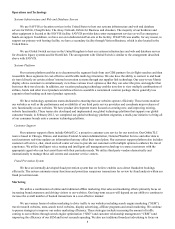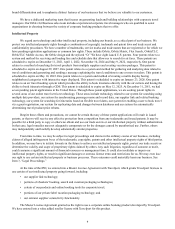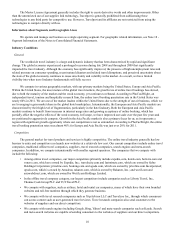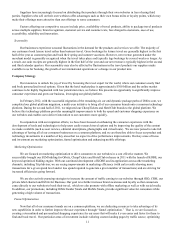Orbitz 2011 Annual Report Download - page 18
Download and view the complete annual report
Please find page 18 of the 2011 Orbitz annual report below. You can navigate through the pages in the report by either clicking on the pages listed below, or by using the keyword search tool below to find specific information within the annual report.18
credit, cash reserves or other forms of financial security or increases in such requirements, lower than anticipated operating
cash flows, or other unanticipated events, such as unfavorable outcomes in legal proceedings, including in the case of hotel
occupancy proceedings, certain jurisdictions' requirements that we provide financial security or pay an assessment to the
municipality in order to challenge the assessment in court, or our inability to recover defense costs.
If in the future, we require more liquidity than is available to us under our revolving credit facility, or we are unable to
refinance or extend our revolving credit facility by its maturity date in July 2013, or we are unable to refinance or repay our
term loan by its July 2014 maturity date, we cannot be certain that other funding would be available to us or be available on
attractive or acceptable terms. If funding is not available when needed, or is available only on unfavorable terms, we may be
unable to take advantage of potential business opportunities or respond to competitive pressures, which in turn could have a
material adverse impact on our results of operations and liquidity.
We have a significant amount of indebtedness, which could limit the manner in which we operate our business.
As of December 31, 2011, we had approximately $472.2 million of outstanding borrowings under our senior secured
credit agreement. Our substantial level of indebtedness could:
• impair our ability to obtain additional financing for working capital, capital expenditures, acquisitions or general
corporate purposes;
• reduce the funds available to us for purposes such as potential acquisitions and capital expenditures because we are
required to use a portion of our cash flows from operations to make debt service payments;
• put us at a competitive disadvantage because we have a higher level of indebtedness than some of our competitors
and reduce our flexibility in planning for, or responding to, changing conditions in the economy or our industry,
including increased competition; and
• make us more vulnerable to general economic downturns and adverse developments in our business.
The credit agreement requires us to maintain a minimum fixed charge coverage ratio and not to exceed a maximum total
leverage ratio. If we fail to comply with these covenants and we are unable to obtain a waiver or amendment, our lenders could
accelerate the maturity of all amounts outstanding under our term loan and revolving credit facility and could proceed against
the collateral securing this indebtedness. If this were to occur, there is no assurance that alternative financing would be
available to us or at favorable terms.
In addition, restrictive covenants in our credit agreement specifically limit our ability to, among other things:
• incur additional indebtedness or enter into guarantees;
• enter into sale and leaseback transactions;
• make new investments, loans or acquisitions;
• grant or incur liens on our assets;
• sell our assets;
• engage in mergers, consolidations, liquidations or dissolutions;
• engage in transactions with affiliates; and
• make restricted payments.
As a result, we may operate our business differently than if we were not subject to these covenants and restrictions.
Our revenue is derived from the travel industry and prolonged substantial decreases in travel volume, particularly air travel,
as well as other industry trends, have historically adversely affected, and may in the future adversely affect, our business,
financial condition and results of operations.
Our revenue is derived from the worldwide travel industry. As a result, our revenue is directly related to the overall level
of travel activity, particularly air travel volume, and is therefore significantly impacted by declines in or disruptions to travel in
the United States, Europe and the Asia Pacific region due to factors entirely outside of our control. For example, the
deterioration of the capital markets and related financial crisis in the second half of 2008 negatively impacted consumer
spending patterns, including spending on travel, thereby reducing demand for our products and decreasing our revenue. While
we have recently seen improvements in the economy, the timing and sustainability of a recovery is uncertain. If economic
























